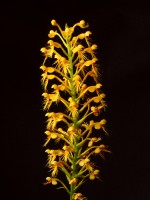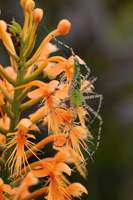Chapman's Fringed Orchid (Platanthera chapmanii)
Part of the Florida's Native and Naturalized Orchids Website
Classification:Kingdom: Plantae - Plants
Subkingdom: Tracheobionta - Vascular Plants
Superdivision: Spermatophyta - Seed plants
Division: Magnoliophyta - Flowering plants
Class: Liliopsida - Monocotyledons
Subclass: Liliidae - Lily/related subclass
Order: Orchidales - Orchid order
Family: Orchidaceae - Orchid Family
Subfamily: Orchidiodeae -
Tribe: Orchideae - Orchidoids.
Subtribe: Orchidinae - Orchis and related.
|
Distribution Map: |
Description: Synonyms: Blephariglottis chapmanii Small, Fl. S.E. U.S.: 314 (1903); Habenaria chapmanii (Small) Ames, Orchidaceae 4: 155 (1910).; Platanthera x chapmanii Summary: Showy terrestrial plants, up to 30 inches (75 cm) tall. Flower head up to 4 inches (10 cm) in height. Blue-green triangular leaves up to six inches at the base, decreasing in size up the fluted stem. Flowers 1.5 to 2 cm tall, orange, with heavily fringed lips and a spur roughly the length of the lip. Common Name: Chapman's Fringed Orchid Habitat: Moist, open pinelands, wet prairies, wet roadsides and ditches. Flowering season: July through September (peaking in August) |
Images:
Description:
Chapman's Fringed Orchid is believed to have originated as a hybrid strain between Platanthera ciliaris and Platanthera cristata, as it seems in every way an intermediate between the two--in overall size and in flower shape and size. In fact, it is known in many publications as Platanthera x chapmanii, owing to its putative hybrid status.
At present, however, it often is found in areas where one or the other parent species (or both) is not present, where it often forms substantial, stable colonies. For this reason, it has been elevated to the status of a species in its own right.
This is one of the rarest orchids in the United States, known primarily from a few scattered populations in Florida, Texas, and Georgia. According to Paul Martin Brown in his Wild Orchids of Florida, roughly 90% of the known plants are found in Florida. Where they are found, they can become locally abundant, and it is also fortunate that many of these localities exist within protected state and national forests.
Copyright © 2009-2020 Prem Subrahmanyam, All Rights Reserved.
No Text or Images from this web site may be used, in whole or in part, without the express permission of the author.
For further information, see the Terms of Use page.








